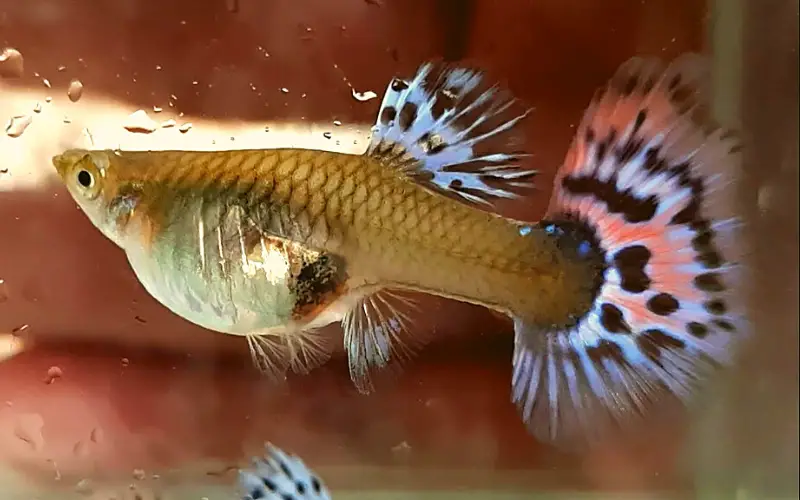Are guppies livebearers or egg layers? If you’re an aquarium hobbyist, learning the facts about guppy childbirth or egg laying is essential. So, do guppies lay eggs or Live Birth?
Guppies are livebearers fish; they don’t lay eggs like other species but instead give birth to live fry that have already developed within their bodies.
The guppy livebearer species fish, also called the million fish, possesses the unique ability to conceive shortly after delivering fry.

In this ultimate guide, we’ll explain exactly how guppies reproduce and answer all of your questions regarding these beautiful tropical fish.
We’ll cover topics such as gestation periods, labor signs, what to do when giving birth begins, and more so that you can make sure your tank has healthy guppy fries in the future!
Table of Contents
ToggleDo Guppies Lay Eggs or Give Birth?
Will guppy give birth or lay eggs? Guppies are live-bearing fish, and the female guppy gives birth to fries. Guppies do not produce eggs, unlike other fish species, such as goldfish. Female guppies have their internal egg sacs, which they use to give birth to their offspring once they reach maturity.
The process of giving birth is similar in that the mother guppy will release single or several fries from guppies egg layers sack at a time before continuing with this process until she has released all her baby guppies.

Because there is no need for gestation in external water bodies or substrates, female guppies can start reproducing soon after reaching sexual maturity. They can produce up to a thousand guppy fry within a year, depending on environmental conditions!
How Do Guppies Give Birth?
Do guppy fish lay eggs or give birth? Guppies are fascinating livebearers! Unlike fish that lay eggs, female guppies store fertilized eggs internally.
After a pregnancy of around 22-30 days, they release fully formed fry, live swimming guppy babies! These little ones are independent but can be easy prey for other fish.
The process of guppies giving birth is known as “live-bearing” or “viviparity.” Here’s how it typically occurs:
- Mating: Male guppies have a specialized anal fin called a “gonopodium” that they use to transfer sperm to the female. During mating, the male approaches the female and inserts his gonopodium into her genital opening, releasing sperm.
- Fertilization: The female guppy has internal fertilization, meaning the eggs are fertilized inside her body by the sperm received from the male during mating.
- Gestation: After fertilization, the embryos develop within the female’s body. The gestation period for guppies is relatively short, typically ranging from 21 to 30 days, depending on various factors such as water temperature and the specific guppy species.
- Birth: When the embryos have fully developed, the female guppy gives birth to live young ones, known as fry. The process of giving birth is called “parturition.” The fry are released into the water, and they are capable of swimming and fending for themselves almost immediately.
It’s important to note that guppies are prolific breeders, and a single female guppy can produce multiple broods of fry throughout her lifetime. The fry are usually small and vulnerable, so providing adequate hiding places and appropriate water conditions is essential for their survival.
“My Guppy Laid Eggs” – What Happened?
If you’ve seen your female guppy fish swimming around with long strings of bubbles or eggs trailing behind her, she is not laying them in the way other fish species do.
The most likely explanation is that these are unfertilized guppy eggs that the female has released from her body as part of her reproductive process; this is usually caused by stress or poor water conditions.
If you notice this happening in your tank, it is important to check that your water parameters are within the correct range and adjust them accordingly; doing so will help to reduce the amount of unfertilized guppy fish eggs being produced in the future.
How Do Guppies Reproduce?
Does guppy lay eggs or give birth? To understand how guppies breed, we must first examine their reproductive process. Typically, male guppy fish fertilize eggs post-deposition. But guppies are unique in that their male guppies fertilize the eggs while they’re still inside the female’s body.
The resulting eggs inside their body are miniature replicas of their parents, birthed alive and able to take care of themselves. Gestation typically takes around four weeks, and a female can give birth to up to 1000 newborn guppies in one year with the right environmental conditions.
Guppies are also polyandrous, meaning that a single female may mate with multiple male guppies, which will increase her chances of producing viable offspring. What’s more, many guppies produce two broods a year, and guppy fish store sperm for up to six months!
What Are the Chances of Fancy Guppies Laying Eggs?
Does guppy fish lay eggs? Fancy guppies, or designer breeds, can also be livebearers. Unlike their wild counterparts, however, fancy guppies are bred for specific traits or colors, which can make them more susceptible to stress and less likely to reproduce.
Due to this, it is unlikely that fancy guppy fish lay eggs. It is important to remember that the environment of your separate tank plays a huge role in successful reproduction, and it is essential to ensure that the water parameters are within the correct range for guppies to breed successfully.
Advantages and Disadvantages of Livebearing Fish
Livebearing fish, like guppies, have many advantages over egg-laying species. They are less likely to suffer from parasitic or fungal infections, as the guppy fish eggs are not exposed to the environment.
They are also more productive breeders, as they can give birth throughout the year. Additionally, they are easier to care for, as there is no need to provide an environment suitable for egg incubation.
How to Spot a Pregnant Guppy?
Identifying a pregnant guppy can seem daunting, but knowing what to look for is quite easy. A pregnant female guppy (also known as a gravid guppy) will usually have a gravid spot and enlarged abdomen that may appear “somehow rounder,” according to the National Aquarium.
You may also be able to see the small fry swimming in her abdominal pouch or near her vent area on closer inspection.
In addition, female pregnant guppies are typically larger than males and have larger pelvic fins that form an inverted ‘V’ or triangle shape at the back of their bodies. These pelvic fins flare outward when she is ready to release young and become noticeably swollen before this stage.
The coloration of female guppies can also change during pregnancy – they will often darken and develop vertical stripes along their sides, which run the length of their bodies from head to tail fin. It’s believed that these stripes help camouflage them when they become fatter due to pregnancy, so they don’t stand out as obvious prey targets.
Lastly, if you take note of your female guppy’s feeding habits, you’ll likely observe that gravid females eat more than usual when preparing for birthing – sometimes twice as much!
Female guppies will also display behavioral changes, such as appearing sluggish or swimming erratically around the aquarium before giving birth, so keep an eye out for these signs too!
How Long Are Guppies Pregnant?
How long will it take for your guppy to give birth? The answer to this question largely depends on the environmental conditions and can range from five days to four weeks.
The gestation period usually lasts around 21 to 30 days, but there are always exceptions. Watch for the “gravid patch,” or darkened area where the abdomen meets the tail, which gradually grows darker as the pregnancy advances.
Generally, guppies will become pregnant between the ages of three to six months and will reach sexual maturity at around one year of age and 1.5 inches in size.
It is important to remember that guppies can produce multiple broods a year, with the fry from each brood being released at different intervals, so it is not uncommon for a female guppy to be pregnant multiple times in one year!
How Often Do Guppies Give Birth?
Female guppies can give birth multiple times in one year, depending on the environmental conditions of their tank. Generally speaking, Guppies are known to reproduce every 30 days and can give birth up to 20 times during their lifespan.
However, it is important to note that the exact number of guppy fry produced will vary depending on the age and health of the female guppy and the quality of their environment. It is also important to regularly check the water quality, as poor conditions can reduce reproductive rates and lead to higher mortality rates in fry.
It is essential to provide your guppies with an optimal environment, as this can help to ensure a healthy population of guppies and maximize the number of fries produced.
When the Eggs Are Not Formed Properly?
When eggs are not fertilized? If a female guppy is not able to produce viable eggs, then it can be difficult for the fry to develop properly.
In these cases, it is important to provide an optimal environment for the female guppy, as this can help to ensure that she can produce viable eggs.
It is also important to ensure that the male guppy or any other fish in the tank do not eat the eggs, as this can also reduce fertility rates.
Additionally, it is essential to keep the tank free of parasites and other contaminants which can damage the guppy eggs in tank or prevent them from developing properly.
By providing your guppies with a stable and healthy environment, you can ensure they can produce viable eggs, which will lead to healthy fry.
How to Care for Guppy Fry?
Caring for guppy fry can be a daunting task, especially for those who are new to aquariums. It is important to provide the right environment and proper nutrition to ensure the health and survival of your guppy fry.
Unfortunately, many aquarium enthusiasts fail to realize that caring for guppy fry is much different than caring for adult guppies. Getting these delicate little guppy fish to thrive can be possible with the right knowledge.
The good news is that with our Guppy Fry Care video guide, you’ll never have to worry about your guppy fry again. We’ll teach you all the steps you need to know so that your guppy fry always live in a safe and healthy environment with plenty of growth potential.
Commonly Asked Questions about Pregnant Guppy Signs of Delivery (FAQs)
What do guppy eggs look like?
What do guppies eggs look like? guppies eggs or live birth, Guppies are livebearers, meaning they don’t lay eggs! Instead, the female fertilizes and carries eggs internally until live fry hatch.
How long is a guppy pregnant for?
A guppy’s gestation period typically lasts between 21-30 days. This can vary depending on water temperature and the guppy’s health.
How do you know when a guppy is going to give birth?
How fish give birth? Look for these signs: 1) Boxy belly shape, 2) Darkened gravid spot near the tail, and 3) Listless behavior. These signal a guppy about to give birth within 1-2 days.
Do guppies have babies or lay eggs?
Do guppy fish lay eggs? Guppies are livebearers! This means they give birth to live fry (baby guppies) instead of laying eggs.
Why is my guppy laying eggs?
Do guppies give live birth? Guppies are livebearers! They don’t lay eggs but give birth to live fry after mating with a male. You might confuse the gravid spot (dark area near belly) for eggs.
How many eggs do guppies lay?
How many eggs do guppy fish lay? Guppies are livebearers, meaning they don’t lay eggs. They give birth to live fry after a gestation period.
Where do guppies lay their eggs?
Guppies typically lay their eggs in dense vegetation or specially designed breeding boxes within their aquariums.
Final Thoughts
So, does a guppy lay eggs? In conclusion, understanding whether guppy fish lay eggs or give birth depends on many aspects. Do guppy lay eggs? Guppies can lay eggs, and they reproduce through ovoviviparity when given the right environment and conditions. Furthermore, it is important to understand how to properly care for your guppies during breeding season so you can ensure that the optimal conditions are met.
As guppy owners, it’s important to research appropriate tank maintenance for your guppies – including temperature, PH level, plants, and other tank mates – to provide an ideal environment for ovoviviparous reproduction. With proper care and planning, guppy owners can realize how does guppies lay eggs, and enjoy the amazing process of watching their newfound fry swim around in the tank!
You might also like
- How Does a Guppy Give Birth? A Detailed Guide (with videos)
- Can Guppies Breed with Mollies? Molly Guppy Hybrid (Solved)
- How to Set Up a Guppy Breeding Tank: 7 Easy Tips (Explained)
- Pregnant Guppies Signs of Delivery: Get Ready for the Big Day
- How Often Do Guppies Have Babies? (A Comprehensive Guide)
- Do Guppies Give Birth at Night? (A Comprehensive Guide)
- How Many Babies Do Guppies Have? (Let’s Quell The Myth!)
- What Does Guppy Eggs Look Like: 3 Important Facts!




